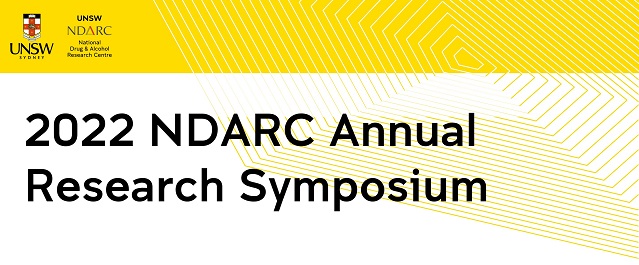The 2022 NDARC Annual Research Symposium was held online via Zoom on Tuesday, 20 and Wednesday, 21 September 2022.
The Symposium showcased the work of leading national and international researchers in the alcohol and other drugs sector and related fields.
Day one recording
Day two recording
Day one: Tuesday, 20 September 2022
|
Session One: Into the future of Indigenous research |
|
| 1.30pm – 1.35pm | Welcome to Country Aunty Barbara Simms |
| 1.35pm – 1.40pm | Welcome and introduction Matthew Craig Director, Centre for Alcohol and Other Drugs |
| 1.40pm – 1.45pm | Director’s welcome Professor Michael Farrell Director, NDARC, UNSW Sydney |
| 1.45pm – 2.15pm | Novel interventions to address methamphetamine use in Aboriginal and Torres Strait Islander Communities Professor James Ward - Director, Poche Centre for Indigenous Health, The University of Queensland This presentation will focus on a research program with multiple strategies undertaken in partnership with Aboriginal Community Controlled Health Services nationally. The study aimed to understand methamphetamine use and its context, and importantly outcomes from an intervention trail, aimed at reducing methamphetamine use among the population. |
| 2.15pm – 2.30pm | Questions |
| 2.30pm – 2.50pm | The integration of Community Reinforcement and Family Training (CRAFT) into routine service-delivery by Aboriginal Community Controlled primary and residential rehabilitation alcohol and other drug (AoD) services Nicole Snowdon - Phd Candidate, NDARC, UNSW Sydney The Community Reinforcement and Family Training (CRAFT) program is an evidence-based cognitive behavioural approach for family members of people experiencing an alcohol or other drug problem. CRAFT has not been trialled for Aboriginal and Torres Strait Islander people before, and this project aims to explore the acceptability, feasibility and effectiveness of CRAFT when delivered by Aboriginal Community Controlled AoD service providers as part of their routine service delivery. |
| 2.50pm – 3.00pm | Questions |
| 3.00pm – 3.15pm BREAK |
|
| Session two: Exploring novel treatments Chair: Dr Anthony (Tony) Gill - Clinical Director, Alcohol and Other Drugs, Southern NSW Local Health District |
|
| 3.15pm – 3.30pm | Spotlight presentations NDARC higher degree research (HDR) candidates and early career research (ECR) staff share three-minute presentations |
| 3.30pm – 3.50pm | The two year follow up of the CoLAB study cohort Professor Michael Farrell - Director, NDARC, UNSW Sydney Following the publication of the one-year CoLAB study of 100 people who were started on depot buprenorphine, a second year of follow up has been completed. The key findings including treatment retention and secondary outcomes will be presented. |
| 3.50pm – 4.10pm |
Text messaging interventions for smoking cessation |
| 4.10pm – 4.30pm |
Lisdexamfetamine for the treatment of acute methamphetamine withdrawal |
|
4.30pm – 4.40pm |
The next big step in methamphetamine pharmacotherapy in Australia Associate Professor Rebecca McKetin - Associate Professor, NDARC, UNSW Sydney There has been a resurgence of methamphetamine clinical trial activity in Australia with the recently completed N-ICE trial (N-Acetylcysteine for methamphetamine dependence) and the LiMA trial (lisdexamphetamine for the treatment of methamphetamine addiction). On the back of recent developments in the USA, and this enhanced capacity for clinical trials on methamphetamine dependence, we are now undertaking a Phase 3 double-blind placebo-controlled trial of mirtazapine for methamphetamine dependence. |
| 4.40pm – 4.55pm | Questions |
| 4.55 – 5.00pm | Director’s closing Professor Michael Farrell |
Day two: Wednesday, 21 September 2022
|
Session one: Evolving priorities |
|
| 1.30pm – 1.35pm | Director’s welcome Professor Michael Farrell |
| 1.35pm – 1.50pm | Emerging trends in drug use, harms, and markets: Findings from Drug Trends 2022 Dr Rachel Sutherland - Deputy Program Lead of Drug Trends, NDARC, UNSW Sydney Findings from the 2022 Illicit Drug Reporting System interviews (a sentinel sample of people who inject drugs) and the 2022 Ecstasy and Related Drug Reporting System interviews (a sentinel sample of people who use stimulants) will be presented for the first time. These two crucial monitoring systems have been running for approximately two decades across Australia. Historical trends, as well as highlights from 2022, will be discussed in the context of shaping responses to drug related harms in Australia. Given the dynamic nature of drug use and drug markets, understanding and mapping evolving trends is vital. |
| 1.50pm – 2.05pm | Changes in illicit drug markets, use and harms in Australia since the COVID-19 pandemic Associate Professor Amy Peacock - Program Lead for Drug Trends, NDARC, UNSW Sydney This presentation will give an overview of the current evidence as to changes in illicit drug markets, use and harms in Australia since the onset of the COVID-19 pandemic and associated restrictions. Included in the presentation will be results from new analyses on trends in key illicit drug market indicators, and study of drug-related hospitalisations, deaths and treatment episodes over the course of the pandemic. This presentation will highlight what we know – and what we are still yet to establish – in understanding the potential impacts of the pandemic in Australia. |
| 2.05pm – 2.35pm |
COVID-19 in the midst of the Canadian opioid epidemics: The bad, the good and the potential revolution |
| 2.35pm – 3.00pm |
Panel discussion: What have we learnt from the COVID-19 pandemic and what should be considered when the next threat emerges? |
| 3.00pm – 3.15pm BREAK |
|
| Session two: Informing policy options Chair: Suzie Hudson - Clinical Advisor, Centre for Alcohol and Other Drugs |
|
| 3.15pm – 3.25pm | Spotlight presentations NDARC higher degree research (HDR) candidates and early career research (ECR) staff share three-minute presentations. |
| 3.25pm – 3.35pm | Using data linkage to examine the effectiveness of methadone and buprenorphine for opioid dependence: An overview of the NSW OATS study Scientia Professor Louisa Degenhardt - Deputy Director, NDARC, UNSW Sydney |
| 3.35pm – 3.55pm | Self-harm and suicide during and after opioid agonist treatment (OAT): a cohort study in primary care patients in England Professor Matthew Hickman - Head of Population Health Sciences and interim Head of Bristol Medical School People with Opioid Use Disorders (OUD) have a substantially elevated risk of mortality across multiple causes of death compared to the general population. OAT reduces mortality risk, especially for overdose and suicide. But it has also been shown that there are elevated risks of overdose in the first four weeks after OAT initiation and cessation of opioid agonist treatment. We aimed to investigate whether the rate of self-harm and suicide among people in OAT also differs during initiation, cessation, and the remainder of time on and off treatment. |
| 3.55pm – 4.10pm | Changes in and correlates of Australian public attitudes toward illicit drug use Professor Don Weatherburn - Professor, NDARC, UNSW Sydney This presentation explores Australian public support for more lenient treatment of persons found in possession of small amounts of illegal drugs for personal use. There is strong support for legalising use of cannabis. There is little support for legalising use of ecstasy and cocaine but growing public support for a less punitive approach to those who use these drugs. There is little public support for a change in the current approach to heroin and methamphetamine. |
| 4.10pm – 4.25pm | Questions |
| 4.25pm – 4.50pm |
Panel discussion: Contrasting e-cigarette policy across Australia, the United Kingdom and New Zealand |
| 4.50 – 5.00pm | Director’s closing Announcement of spotlight presentation people’s choice award Announcement of NDARC awards Professor Michael Farrell |
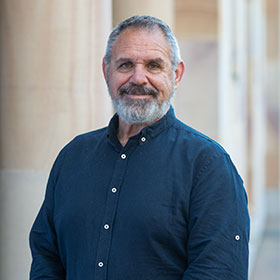
Professor James Ward - Director, Poche Centre for Indigenous Health, The University of Queensland
Professor James Ward is a Pitjantjatjara and Nukunu man, an infectious diseases epidemiologist and a national leader in Aboriginal and Torres Strait Islander research. He is currently the Director of the Poche Centre for Indigenous Health at The University of Queensland.
Holding various roles over the last 25 years in Aboriginal public health policy for both government and non-government organisations, in urban regional and remote communities he has built a national program of research in the epidemiology and prevention of infectious diseases, with a particular focus on STIs, HIV and viral hepatitis in Aboriginal and Torres Strait Islander communities.
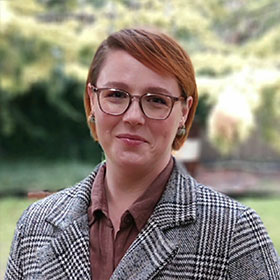
Nicole Snowdon - Phd Candidate, NDARC, UNSW Sydney
Mrs Snowdon has over 10 years’ experience as a social work practitioner in the government and non-government alcohol and other drugs (AOD) and child protection sectors in regional and rural NSW. Mrs Snowdon is currently completing her PhD at the National Drug and Alcohol Research Centre, UNSW Sydney, and has a strong interest in evaluating AOD interventions for marginalised groups in the practice setting.

Professor Michael Farrell - Director, NDARC, UNSW Sydney
Professor Michael Farrell FRCP FRCPsych is the Director of NDARC since 2011. Before that he was Professor of Addiction Psychiatry at the Institute of Psychiatry at Kings College London. His extensive research interests include treatment evaluation, national and international drug policy. He is the Chair of the International Consortium on Health Outcome Monitoring Substance Use working Group and Editor of the Cochrane Drug and Alcohol Group. He has a long-standing interest in drug dependence, comorbidity and drugs in the wider criminal justice system. He has been a member of the WHO Expert Committee on Drug and Alcohol Dependence since 1995.
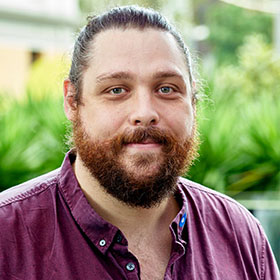
Liam Acheson - PhD Candidate, NDARC, UNSW Sydney
Liam is a PhD candidate at the National Drug and Alcohol Research Centre at UNSW Sydney collaborating with the National Centre for Clinical Research on Emerging Drugs. Liam is also working as a research officer for the Alcohol and Drug Service at St. Vincent’s Hospital, Sydney. His research interests include treatments for methamphetamine withdrawal, the intersection of sleep and substance use and examining the experiences of people who use drugs in hospital and clinical trials.
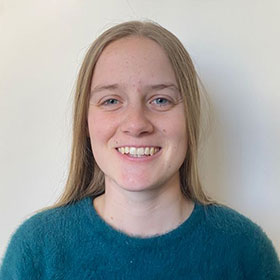
Bridget Howard - Clinical Research Coordinator, NDARC, UNSW Sydney
Bridget Howard is a Clinical Trial Coordinator at the National Drug and Alcohol Research Centre, UNSW Sydney. Bridget is currently working on large randomised controlled trials for smoking cessation in priority populations, looking at both pharmacological and behavioural interventions, in particular an upcoming study investigating text messaging for smoking cessation among Australian smokers.

Associate Professor Rebecca McKetin - Associate Professor, NDARC, UNSW Sydney
Associate Professor Rebecca McKetin (BSc(Psychol)Hons. PhD) leads a program of research into stimulant use epidemiology and interventions at the National Drug and Alcohol Research Centre, UNSW Sydney. Her current research involves the online delivery of psychological help for people who use stimulants (Breaking the Ice) the trialling of new pharmacotherapy options for methamphetamine dependence (the Tina Trial, the N-ICE trial; the LiMA study) and the development of novel responses to methamphetamine use in Aboriginal and Torres Strait Islander communities (NIMAC). Rebecca established the first longitudinal treatment outcomes study for methamphetamine use internationally (the Methamphetamine Treatment Outcomes Study, MATES), a 3-year prospective cohort of 501 people dependent on methamphetamine, demonstrating the impact of community-based treatments for this drug. She has adapted in-direct prevalence estimation methods to estimate the number of dependent methamphetamine users in Australia and has been involved in the development of regional systems to monitor methamphetamine and other drugs in the Asia Pacific. Her work has been pivotal in quantifying the risk of psychosis, violence and other mental health outcomes related to the use of methamphetamine. She is a Senior Editor for Addiction, a consultant to the United Nations, and a member of the Australian Institute of Policy and Science.

Dr Rachel Sutherland - Deputy Program Lead of Drug Trends, NDARC, UNSW Sydney
Dr Rachel Sutherland is a Senior Research Fellow at the National Drug and Alcohol Research Centre, UNSW Sydney, currently holds a National Health and Medical Research Council Investigator Fellowship (2021-2025) and is Deputy Program Lead of Drug Trends. Her program of research is focused on monitoring systems for detecting trends in illicit drug use, including new psychoactive substances, and developing and evaluating novel responses to emerging drugs of concern.

Associate Professor Amy Peacock - Program Lead for Drug Trends, NDARC, UNSW Sydney
Dr Amy Peacock is an Associate Professor, NHMRC Investigator Fellow, and Program Lead for Drug Trends at the National Drug and Alcohol Research Centre, UNSW Sydney.

Professor Julie Bruneau - Professor in the Department of Family and Emergency Medicine, Université de Montréal
Dr Julie Bruneau holds the Canada Research Chair in Addiction Medicine, is Professor in the Department of Family and Emergency Medicine at Université de Montréal and clinical scientist at the Centre Hospitalier de l’Université de Montréal (CHUM) research center. She is the scientific director of the Quebec node of the Canadian Research Initiative on Drug Misuse. Her research contributes to a better understanding of factors impeding and facilitating harm reduction efforts to reduce HIV and HCV transmission and to the evaluation and implementation novel interventions for equitable access to quality health care for people who use drugs.

Professor Matt Hickman - Head of Population Health Sciences and interim Head of Bristol Medical School
Professor Matt Hickman is Head of Population Health Sciences (PHS) and interim Head of Bristol Medical School, NIHR Senior Investigator, and Honorary Professor at National Drug and Alcohol Research Centre (NDARC), UNSW Sydney.

Scientia Professor Louisa Degenhardt - Deputy Director, NDARC, UNSW Sydney
Louisa is UNSW Scientia Professor and NHMRC Senior Principal Research Fellow and Deputy Director at the National Drug and Alcohol Research Centre (NDARC), UNSW Sydney. She was awarded her PhD in 2003, examining the comorbidity of drug use and mental disorders in the Australian population. She has honorary Professorial appointments at University of Melbourne’s School of Population and Global Health, Murdoch Children’s Research Institute, and University of Washington’s Institute of Health Metrics and Evaluation. Louisa conducts diverse epidemiological studies including analysis of large-scale community and clinical population surveys, data linkage studies focusing upon people with a history of drug dependence or chronic pain, and cohort studies of young people. Louisa has published over 560 peer reviewed papers, 120 technical reports and monographs, three books and 45 book chapters. Her H-index in Scopus is 80, and 104 in Google Scholar.
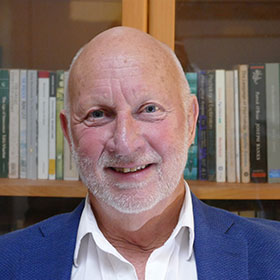
Professor Don Weatherburn - Professor, NDARC, UNSW Sydney
Don Weatherburn is a Professor at the National Drug and Alcohol Research Centre and was formerly Executive Director of the NSW Bureau of Crime Statistics and Research. He has authored or co-authored more than 200 publications, including four books.
Certificates of attendance are available for all sessions. Attendees must liaise with their supervisor or appropriate industry body to confirm that the 2022 NDARC Annual Research Symposium is eligible towards continuing professional development hours.


